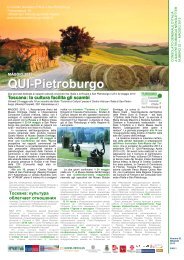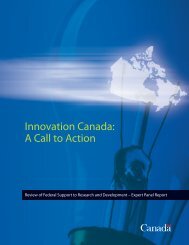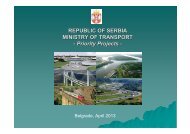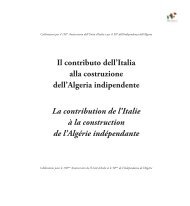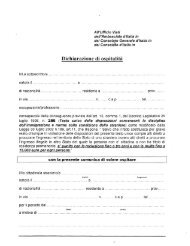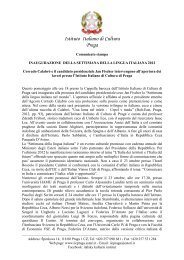Investment in Italy
Investment in Italy
Investment in Italy
- No tags were found...
You also want an ePaper? Increase the reach of your titles
YUMPU automatically turns print PDFs into web optimized ePapers that Google loves.
<strong>Investment</strong> <strong>in</strong> <strong>Italy</strong>6.7.3Specifics of non-resident taxationNon-resident <strong>in</strong>dividuals are subject to <strong>in</strong>dividual <strong>in</strong>come tax on Italian-source <strong>in</strong>come. Asa general rule, <strong>in</strong>come tax is calculated <strong>in</strong> the same way as for resident <strong>in</strong>dividuals, on theaggregate <strong>in</strong>come derived from <strong>Italy</strong>.Non-residents must file an annual tax return for <strong>in</strong>come from Italian sources, other than<strong>in</strong>come subject to a f<strong>in</strong>al withhold<strong>in</strong>g tax or to substitute tax. The procedure is the same asfor resident <strong>in</strong>dividuals.Income from employment (<strong>in</strong>clud<strong>in</strong>g pensions) is subject to taxation <strong>in</strong> <strong>Italy</strong> if the work isperformed <strong>in</strong> <strong>Italy</strong>. Pensions, similar allowances and term<strong>in</strong>ation payments are also subjectto taxation <strong>in</strong> <strong>Italy</strong> if paid by the state, residents of <strong>Italy</strong> or Italian permanent establishmentsof non-residents.<strong>Investment</strong> <strong>in</strong>come and professional <strong>in</strong>come are subject to a f<strong>in</strong>al withhold<strong>in</strong>g tax or to asubstitute tax. Where withhold<strong>in</strong>g or substitute tax is not applied, the non-resident is, whenfil<strong>in</strong>g a tax return, subject to taxation at the ord<strong>in</strong>ary <strong>in</strong>come tax rates.Income from a bus<strong>in</strong>ess carried on <strong>in</strong> <strong>Italy</strong> is only taxable if it is earned through a permanentestablishment. Income from a profession practised <strong>in</strong> <strong>Italy</strong> by a non-resident is subject to a30 percent f<strong>in</strong>al withhold<strong>in</strong>g tax if the payer is a withhold<strong>in</strong>g agent. Income from a profession<strong>in</strong>cludes directors’ fees paid by a resident company.Non-residents are also subject to IRAP on the net value of production derived from abus<strong>in</strong>ess or profession run/practised <strong>in</strong> <strong>Italy</strong> through a permanent establishment or a fixedbase for at least three months.Dividends are subject to a f<strong>in</strong>al withhold<strong>in</strong>g tax of 27 percent (12.5 percent <strong>in</strong> the case ofsav<strong>in</strong>g shares, e.g. shares without vot<strong>in</strong>g rights) unless a lower rate applies under a taxtreaty. If tax was also paid on the dividends <strong>in</strong> the recipient’s country of residence, a refundequal to four-n<strong>in</strong>ths of the Italian withhold<strong>in</strong>g tax may be claimed.In general, <strong>in</strong>terest payments to non-resident <strong>in</strong>dividuals are subject to a f<strong>in</strong>al withhold<strong>in</strong>gtax at the rates applicable to <strong>in</strong>terest paid to residents. However, a 27 percent rate applies toloan <strong>in</strong>terest paid to <strong>in</strong>dividuals resident <strong>in</strong> a country or territory outside the European Unionwith a preferential tax regime.In addition, <strong>in</strong>terest paid to non-residents on deposit accounts with banks and post officesis exempt. Interest paid to non-residents on bonds issued by the state, banks or listedcompanies, and with a maturity of at least 18 months, is exempt if the beneficial owner isresident <strong>in</strong> a country with which <strong>Italy</strong> has an adequate exchange of <strong>in</strong>formation. In order tobenefit from this exemption, the non-resident must deposit the bonds with a resident bankor other approved <strong>in</strong>termediary.Royalties paid to non-residents are subject to a 30 percent withhold<strong>in</strong>g tax, which isgenerally applied to 75 percent of the gross payment, result<strong>in</strong>g <strong>in</strong> an effective rate of 22.5percent. However, if the recipient is not the author or the <strong>in</strong>ventor and the underly<strong>in</strong>g rightwas acquired without consideration the tax is applied to the full amount of the royalties.66© 2012 KPMG S.p.A., KPMG Advisory S.p.A., KPMG Fides Servizi di Amm<strong>in</strong>istrazione S.p.A., KPMG Audit S.p.A., Italian limited liability share capital companies, and Studio Associato Consulenza legale e tributaria, anItalian professional partnership, are member firms of the KPMG network of <strong>in</strong>dependent member firms affiliated with KPMG International Cooperative (“KPMG International”), a Swiss entity. All rights reserved.



